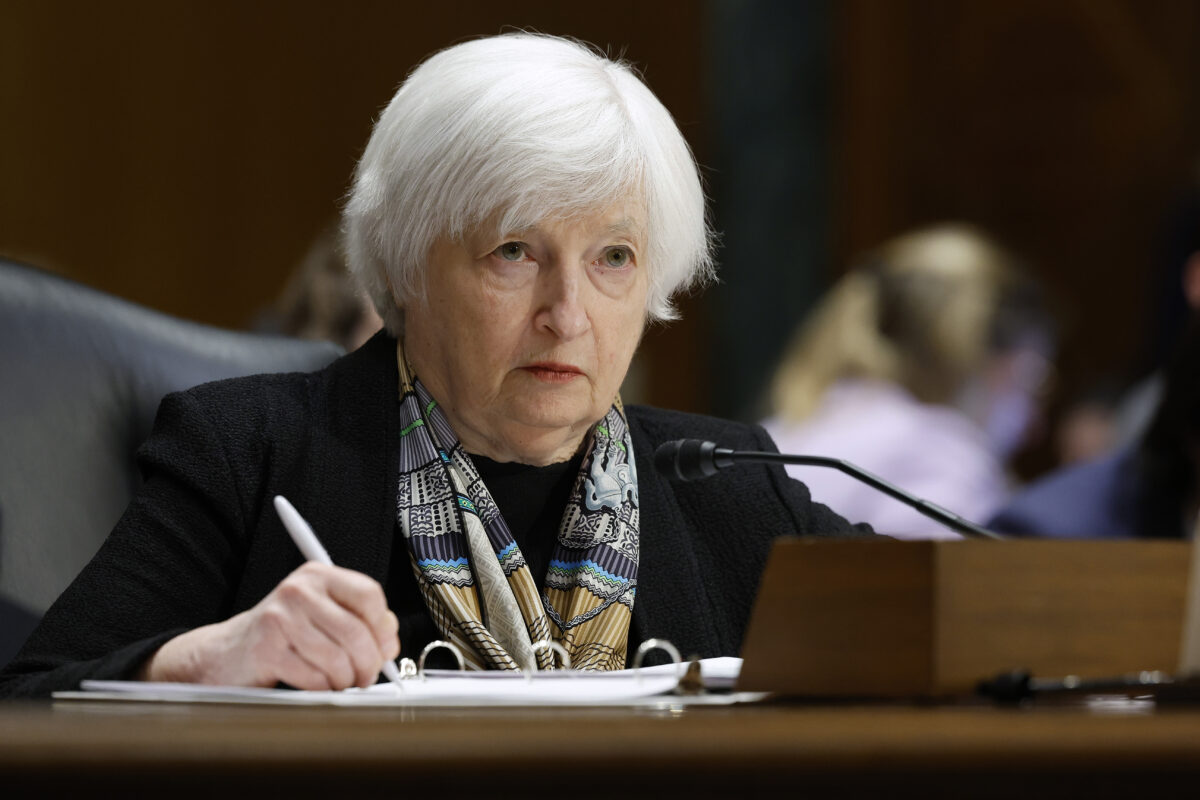
As the debt ceiling standoff continues to grip Washington, House Speaker Kevin McCarthy (R-Calif.) said Monday that President Joe Biden might have a “secret plan” to avoid a debt default and, if so, the Republican lawmaker is all for it.
McCarthy made the remarks during a press conference on Capitol Hill while responding to a question about Republican demands for spending cuts in exchange for agreeing to lift the $31.4 trillion debt cap.
“We raised the debt limit,” McCarthy told reporters, referring to the Republican legislative proposal that pairs lifting the ceiling by $1.5 trillion with $4.5 trillion in spending cuts over a decade.
Biden has insisted on a “clean” bill to raise the cap and vowed to veto the GOP bill if it reaches his desk, drawing criticism from Republicans that he’s ignoring the problem and could, in McCarthy’s words, “bumble his way into a default” on the nation’s debt obligations.
“Maybe his secret plan is to wait till the last minute and pass our bill,” McCarthy said of Biden. “I’m OK with that,” he added.
While McCarthy’s remark about the “secret plan” may have made in jest, it comes as no clear solution has emerged so far for resolving the deadlock and as speculation has grown that Biden might have to accept some spending cuts to strike a deal.
A recent Reuters report cited anonymous sources claiming that White House officials believe that Biden is prepared to compromise with Republicans to some extent on some of their spending demands.


The president also appeared to hint at possible cuts himself while speaking at an event last week: “We should be cutting spending and lowering the deficit without a needless crisis, in a responsible way.”
McCarthy is slated to meet with Biden on Tuesday for another round of talks on lifting the debt cap and averting a potential default.
A number of prominent figures from the Biden administration—including Treasury Secretary Janet Yellen and White House National Economic Council director Lael Brainard—have said a default would be “catastrophic.”
“Time is running out” to avert a debt ceiling crisis, Yellen said in remarks prepared for delivery to a banking conference Tuesday.
“We are already seeing the impacts of brinkmanship,” she continued. “Investors have become more reluctant to hold government debt that matures in early June.”
The cost of insuring against a U.S. sovereign debt default has soared to a record high in recent weeks amid the standoff. Spreads on 1-year credit default swaps, a market-based gauge of default risk, climbed to a record high of 172 basis points on May 10.
Yellen warned recently that the country could breach the statutory $31.4 trillion debt ceiling as soon as June 1, which would require the government to postpone some bill payments if a deal isn’t reached before then.
“The U.S. economy hangs in the balance. The livelihoods of millions of Americans do too. There is no time to waste. Congress should address the debt limit as soon as possible,” she said in Tuesday’s remarks.


The Congressional Budget Office (CBO) recently released revised guidance indicating that “there is a significant risk that at some point in the first two weeks of June, the government will no longer be able to pay all of its obligations” if the debt ceiling isn’t lifted.
Besides growing default risk as reflected in the credit default swap spreads, finance leaders on Wall Street have been growing increasingly nervous amid the deadlock.
Citigroup CEO Jane Fraser said recently that the negotiations on raising the ceiling are “more worrying” than previous episodes.
JPMorgan Chase CEO Jamie Dimon said the bank is convening weekly meetings to prepare for what could be a major event that shakes markets.
“The closer you get to it, you will have panic,” Dimon told Bloomberg TV last week. “Markets will get volatile, maybe the stock market will go down, the Treasury markets will have their own problems.”
Biden has said he’s “absolutely certain” that the country will avert a default but time is running out to find a solution.
McCarthy said Monday that the debt limit talks are “not in a good place,” adding that Biden had delayed negotiations for 100 days.
Biden’s agreement to a meeting with McCarthy, which is scheduled for 3 p.m. ET on Tuesday, offers some hope for a breakthrough.
A recent poll conducted by the Trafalgar Group (pdf) indicates that 40.8 percent of Americans want the debt ceiling raised without any spending cuts.
By contrast, 59.2 percent want spending reductions, with 37.2 percent saying the debt cap should be lifted but only “if they cut spending” while 22 percent were in favor of no increase at all to the debt limit.
Concerns about fallout from a potential default have fueled broader concerns about the economy.
Slowing economic growth in the United States appears increasingly likely to accelerate into a full-blown recession.
The probability that the country will enter a recession within the next year has risen to 68.2 percent, according to the New York Fed, which is the highest level since 1982.
The Fed’s recession risk indicator is now greater than it was in November 2007, not long before the subprime crisis, when it stood at 40 percent.
A recent poll showed that most Americans believe that the country is headed for a recession while pessimism regarding the U.S. economy has hit a record high.
In a sign that concerns about stagflation are coming to the forefront once again, consumer expectations about the strength of the economy one year ahead plummeted by 23 percent.
“Long-run expectations slid by 16 percent as well, indicating that consumers are worried that any economic downturn will not be brief,” Joanne Hsu, University of Michigan Surveys of Consumers director, said in a statement.
Stagflation is a combination of slowing growth and high inflation, a toxic brew that tends to be challenging for Fed policymakers to deal with as a remedy, because one makes the other worse.
“The University of Michigan survey data disappointed on both US consumer sentiment and long-term inflation expectations. At the headline level, look for this to fuel some #stagflation worries,” Mohamed El-Erian, Allianz’s chief economic adviser, said in a Twitter post.
While macroeconomic data don’t show an imminent recession—the Federal Reserve Bank of Atlanta’s real-time GDP estimate notched a reading of 2.7 percent on May 8—consumer sentiment fell sharply in April, suggesting Americans are souring on the economic outlook.




Discount Applied Successfully!
Your savings have been added to the cart.